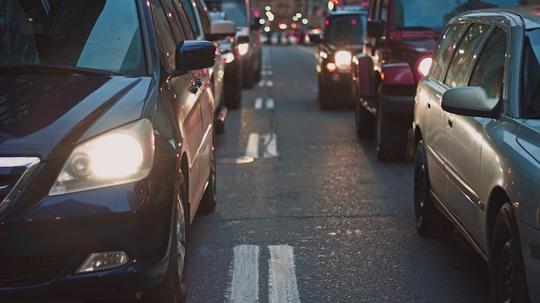
Road safety advocates could get a shot at justice with a new app launching in D.C. later this month. The creators of the OurStreets app are seeking to close the gap of dangerous driving behavior that goes unreported.
OurStreets is the brainchild of CEO Mark Sussman and CTO Daniel Schep, a pair of transit nerds with a strong combined background in data analytics and software engineering. They are merging their tech chops with their mindset of transportation safety activism to bring forth the new app, which will outsource incident reporting from any willing user. The Washington Post was the first to report on OurStreets.
In the app, if a user sees a vehicle blocking a bike lane, disobeying a signal or a number of other street sins, they can report it by taking a picture of the incident. Combined with metadata and the license plate number, the report is a time and place record of everything about the infraction.
Making it worth it
Where the data goes is still somewhat of a moving target, but OurStreets has a clear vision. Sussman said that the company is in contract conversations with D.C.’s Department of For-Hire Vehicles (DFHV), which oversees taxicabs and ride-hailing services, to feed reports directly to its complaint system. He said he’s also discussed similar potential integrations with the D.C.’s Departments of Public Works and Transportation, for a more holistic implementation of the app. The objective is for the agencies to have a way to investigate safety violations that they otherwise would have missed.
When the app has its soft launch on Saturday, the reports it generates will initially be available to other stakeholders, like academic researchers and the Washington Area Bicyclist Association (Schep and Sussman are both WABA members), which wants to use the data in its efforts to promote safer cycling in the region. Sussman is confident that municipal contracts will soon follow, setting the stage for a bigger, more marketed launch in the spring.
“What's happening is just figuring out the right contracting mechanism because something like this is, you know, innovative and new. And because we’ve touched so many different stakeholders within the municipal government, they're trying to figure out the best way to work with us,” Sussman told DC Inno.
The municipal contracts are a big chunk of OurStreets’ business model. The company wants to give agencies access to free dashboards overviewing when and where incidents commonly occur. Beyond that, a paid software-as-a-service offering would provide direct integration with the agencies and specific details of reported infractions.
OurStreets also hopes that a forthcoming feature allowing users to report dockless vehicle violations will also draw attention from city agencies and micromobility companies. Outsourcing the reporting of parking violations of dockless bikes and scooters to OurStreets users could be a way to relieve the stress of the crowding that the vehicles sometimes cause.
So why would someone want to whip out their phone to snitch on a stranger blocking a bike lane? Sussman says the niche community of vocal transit safety advocates is becoming less niche; the desire to deter reckless behavior is a natural incentive.
“Even if we think about that tourist that comes to D.C. and rides the scooter up and down the [National] Mall one time, all of a sudden they're exposed to what folks like myself see every day in terms of dangers that that automotive behavior can cause,” Sussman said. “People are not one thing. They are multi-modal. And we really think that this is going to resonate with a much larger population.”
Activism to business
OurStreets' origin story illustrates the demand that Sussman and Schep hope the app will fill. In 2018, Schep created the @HowsMyDrivingDC Twitter account. It’s a bot that, when prompted with any license plate number from D.C. streets, spits out a list and dollar amount of that vehicle’s outstanding citations – data that is publicly accessible on the D.C. DMV website.
Sussman explained that Schep made the bot to automate an existing phenomenon: “On ‘D.C. bike Twitter,’ folks would take photos of cars in bike lanes, then go onto the D.C. DMV website, look up the license plate number, take a screenshot of the outstanding citations and post them side by side on Twitter and say, ‘Take a look at this guy. He has $2,000 in citations and he was blocking a bike lane or whatever.’”
Sussman and Schep, who struck up a friendship at a local “Transportation Techies” meetup, decided to turn the bot idea into more than a public shaming tool and created the How’s My Driving progressive web app. OurStreets, by contrast, will be available on the App Store and Play store and have more advanced features, like being able to extract geolocation photos. As OurStreets’ predecessor, How’s My Driving actually included a pilot of the DFHV integration that OurStreets is now looking to solidify and scale.
Sussman said OurStreets completed its “friends and family” funding round for $200,000 in the fall and has one full-time employee working on the front-end design of the app. Another worker has been polishing up the looks of the website and app in exchange for equity.
The app has had about 2,500 sign-ups in anticipation of the launch, according to Sussman. He said that the interest so far has largely been driven by a vocal community of transit and safety advocates, of which Sussman and Schep are a part. The motivation to make the app is rooted in the pair’s passion for urban road safety. He says they’ve been activists and volunteers in that regard for “pretty much our entire adult lives.”
The impetus to turn the passion into a business is to make the efforts sustainable, Sussman said, creating a “virtuous cycle” between the city and users.
“We have to be able to work directly with cities ... so that they actually pay attention to the data that we're collecting. And from the user's perspective, those integrations are vital so they can see impacts and continue to use the app,” he said.




